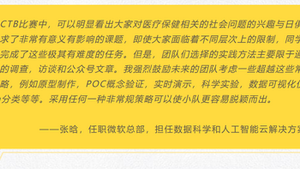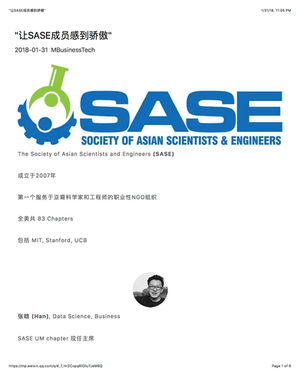Empower Global Businesses with Data Science
- Han Zhang
- Jun 23, 2017
- 6 min read

Combining Business with Data Science is relatively new as an undergraduate academic pursuit, but it has existed in various industries for a long time. It is known to almost every single successful modern businessman that data science can truly empower businesses of any size, as long as you have the right people to do the hard work. I am willing to spend 5 years in college to obtain the relevant skill sets so that I will be the “right person” to bring unique values to my firm. Even more, I aspire to combine data science with business in unexpected, unconventional, but truly groundbreaking ways. It could be using artificial intelligence to achieve perfection in stock trading; it could be identify the patterns in terabytes of business data in order to predict the next “Facebook” or “Apple”. I am very excited for the true potential of these two seemingly distinctive yet highly connected academic disciplines.
I have gained a wide range of skills through my two academic focuses, and they have prepared me well to tackle world's toughest challenges.
Active Learning
In order to thrive in a constantly-changing business world, I must be able to seek out new information on a daily basis and figure out a way to apply them at my current work. Data science is also undergoing frequent significant changes, primarily because it is a relatively new field. In order to thrive in my study, I have learned to keep up with the latest technological advancement as well as up-to-date market news. The ability to obtain and utilize new information is crucial to my problem-solving and decision-making processes. I’ve already started to train my active learning skills by reading The Wall Street Journal and other books covering a diverse range of topics, such as Investment, Finance, Politics, and Technology. Regarding data science, although I haven’t been equipped with sufficient technical knowledge to understand the complex process involved with machine learning and artificial intelligence, my abilities to actively seek out new information in the field will prepare me well for my further study.
Complex Problem Solving Based on Quantitative Approaches
Critical Thinking requires strong logic and reason to identify the strengths and weaknesses behind a diverse range of solutions to complex problems. Many of my business classes heavily utilize real-world cases to assist learning, such as analyzing the success of Apple and Google to understand the importance of customer value proposition. By studying the unique problems faced by real companies through cases, I have had the opportunity to develop my complex problem solving skills so that my solution to the problems will be worthwhile and practical.
In addition, I’ve also learned how to approach highly complex problems from quantitive, data-driven perspectives. My emphasis in business school is finance, which is an academic discipline that requires proficient quantitative reasoning capabilities. Understanding how stocks are priced, the financial structure of a Fortune 500 firm, or the Discounted Cash Flow method to value a company are all perfect opportunities for me to perfect my mathematical capabilities, which will in turn strengthen my understanding of the financial industry. In my Data Science academic career, Mathematics, Computer Science, and Statistics are the three pillars for my coursework. My strong background in math and stats areas prepared me well for both theoretical and practical data analysis. I am able to tackle a diverse range of problems with reasonable depth and accuracy, which is highly valued in today’s data-driven industries such as businesses, government, and medicine.
Lastly, my strong background in computer programming provides me with even broader set of tools to use when facing complex problems. Programming is a crucial part of data science, especially when working with a large amount of data. I have extensive coding experiences in C++. I’m relatively proficient in Python, and still learning web development and statistical languages. In my opinion, programming is more like art: it is a creative process that also requires substantial knowledge in relevant subject matters and the tenacity to keep trying faster, more optimized solutions. My experiences with computer science prepares me well for any job functions that require a working knowledge with computer programs and software languages.
Reading Comprehension and Verbal/Written Communication
Business classes often involve extensive readings under strict, tight timelines. Case competitions are particularly known for asking participants to quickly process large amount of written information under extremely short timeframe. I have had to process several reports that were at least 30-40 pages long in order to find the most accurate and relevant information. I have developed very strong reading comprehension capabilities under such occasions, and it will help me perform well in a workplace where strong reading skills are required.
In addition, I’ve also developed strong communication skills. In fact, at least half of my time spent in business school is speaking to others confidently and effectively. No matter it’s networking, class presentations, or team discussions, I always need to present a perfect image of myself to others through speaking. There are no limits in terms of how good a person’s speaking skills can go; therefore, I’m always looking for opportunities to improve myself in this area. Writing skills are also crucial, especially professional business writing. How I present myself in written words through emails, reports, or memos is directly relevant to the outcomes of the tasks that I want to achieve. I’ve spent countless of hours writing class or work related texts, and these experiences are extremely valuable to help me achieve perfection.
Management of Personnel Resources
In business school, I work in a team at almost every single class. How to be an effective and responsible team member and/or leader is crucial to the outcome of the project. I motivate, develop, and direct my team members as they work. Through discussions, I identify the best people for the tasks. I aspire to be a manager in the future; my experiences with diverse teams prepare me well for my future career path.
The following are the skills that I have developed through my extensive team work experiences:
Coordination: I am able to adjust my own actions in relations to other people’s actions. For example, if certain team member shows withdrawn symptoms, I am able to step in, intervene the situation by motivating him/her, and bring out the best of them.
Negotiation: In a team setting, there are often cases when people have conflicting opinions. Under such circumstance, it is important for someone to step in and reconcile differences. I always try to use my negotiation skills to bring the team together. One of the most effective techniques I’ve used is to help people understand the bigger picture behind our project. As a result, people are more inclined to tolerate the differences for the sake of the whole team.
Time Management: Business classes and projects are highly deadline-driven. I have learned how to effectively manage my own time and the time of others so that all potential projects shall be accomplished in time. In a professional work setting, my time management skills will enable me to thrive in a fast-paced industry.
Judgement, Decision Making, and Troubleshooting
Many of my projects at business school require me to analyze the current situation and recommend the best course of action. I have developed excellent judgement and decision making capabilities through such exercises because I had to consider the relative costs and benefits of the potential actions and recommend the most appropriate one. However, the path to success in business is often uneven; there bounds to be problems on the way. Fortunately, the majority of my time with the programming part of data science is debugging or troubleshooting. I have obtained strong skills to identity potential errors within my program designs, which is critical to move the project forward. Troubleshooting skills are essential in almost any work environment, and my experiences in the area will bring unique values for my future employers.
System Analysis, Evaluation, and Design
Businesses are systems that have many objectives, such as maximizing shareholders’ profit and satisfying multiple stakeholders’ interests. By comprehensively studying the organizational behavior of different businesses, I have developed excellent capabilities to determine how effective businesses work and how evolving circumstances and conditions could affect their performances. I’ve also learned to identify measures and indicators of businesses performances and the approbate actions needed to improve or correct the current situation, while keeping the organizational goals in mind.
Similarly, Data Science is also an academic discipline that focuses on systematic thinking. The purpose of data science is not just manipulating data; rather, it’s more about generating useful insights from seemingly disorganized dataset. By thinking from the needs of end-users, such as business managers or government agencies, I am able to effectively create innovative technology design that captures the true essence behind those data. I have also learned to adapt existing technology for new users’ needs.








Comments